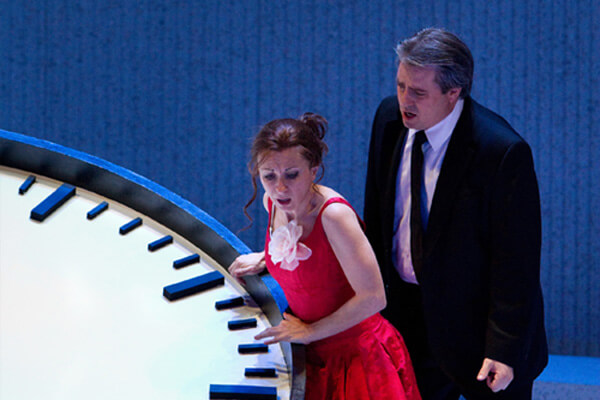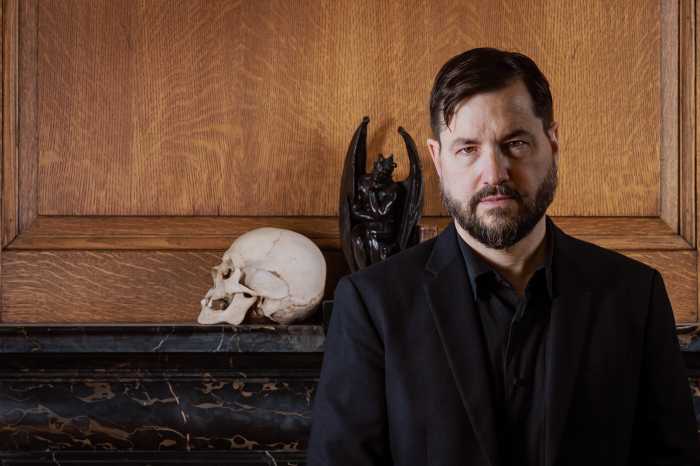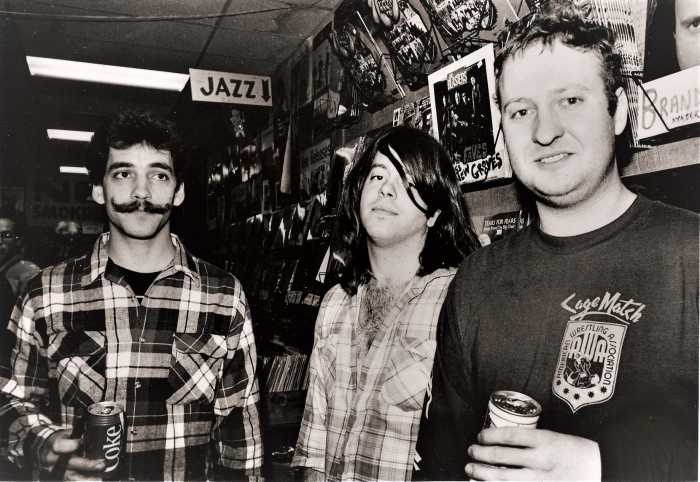This season we have four different companies presenting Verdi’s “La Traviata” in New York City and its environs. The revamped New York City Opera presented their take back in February at the Brooklyn Academy of Music. This month, the Met stars Gallic diva Natalie Dessay in a revival of the expressionistic modern Willy Decker production. Dicapo Opera Theatre is simultaneously performing a scaled-down traditional production in an intimate 200-seat house. On May 11-27, Amore Opera (the surviving progeny of the Amato Opera) throws itself into the competition. This town is crawling with courtesans with bad coughs!
Sadly, Dessay had a real cough and canceled the April 6 opening night of the Metropolitan Opera revival, and veteran soprano Hei-Kyung Hong stepped in for her. Dessay returned for the later performances, including the HD broadcast matinee.
The minimalist Willy Decker production places total focus on the performers — the singers provide the only visual decoration (except for an oversized clock, a long curved bench, and several sofas). The unadorned white semi-circular set suggests an anatomical observation room where the opera’s social and psychological themes are dissected in plain view of the audience.
Hong and Dessay had diametrically opposed strengths and weaknesses, though both lacked the color and weight of voice to command this role in a huge theater like the Met. Hong sang exquisitely and looked girlishly seductive — her freshness belying three decades of service at the Met. She sang carefully and elegantly with finely spun lyrical phrasing and precise coloratura. However, the passion was not there in the voice, which was like a delicately perfect but cool and empty piece of porcelain. When larger than life emotion had to surge through Verdi’s soaring melodies, Hong seemed to fade into the background.
Dessay had the emotion, the understanding of the musical and theatrical intention, and the ability to project intensity and command the stage. What was lacking was a functioning vocal mechanism that would carry her message. Though younger than Hong by five years, Dessay has had two vocal cord surgeries and sounds much older.
Dessay struggled through the second and third performances of the run (more so in the HD matinee broadcast), running out of gas before Act II, scene 2.
On April 18, the soprano evidently felt less pressure, hit a decent E-flat to cap Act I, and sang in a wan careful rehearsal voice in Act II. After tiring during the gambling scene, Dessay rallied for a moving Act III floating a long sustained piano high note at the end of “Addio del Passato.” The damage is really evident in the middle and lower register where the vocal cords will not phonate, leaving a gap in the musical line.
What Dessay can still do is float a delicate thread of tone in the upper third of the voice. Cutting a movingly waif-like and fragile stage figure, Dessay’s highly physical and neurasthenic stage persona is a good fit for Decker’s production. One wondered if the existential angst she projected was that of the heroine of the opera facing death or the singer herself worried about whether her voice will sustain the next phrase.
Recurring illness may have contributed to her distress but how will that explain her recent struggles with “Manon” in Paris? Dessay has announced she is retiring from the opera stage in 2015. She should consider transitioning away from vocally demanding roles like Violetta and the upcoming Elvira in “Puritani” before then.
Tenor Matthew Polenzani returned as Alfredo, acting and singing with greater confidence than last season. His voice is narrow and cool, lacking Italianate warmth and squillo on top, but he is an alert musician.
Dmitri Hvorostovsky looked like a dapper Russian gangster as the bourgeois paterfamilias Germont in a snugly tailored three-piece suit and rakishly tilted fedora. He took Decker’s coldly cynical interpretation too much to heart (and voice) on opening night, sneering at everyone and singing bluntly in a loudly monochromatic if handsome baritone. Later on he added more light and shade to his singing, which was still marred by some loud breathing and lunges at high notes.
The overextended principal conductor Fabio Luisi, who is concurrently leading “Manon” and all the “Ring” operas, seemed uncharacteristically slipshod on the podium. Choral entries were missed, horns were blatting, and too often he seemed to not know whether to push Dessay forward or hold back until her voice came together.
The NYCO rented a dreary, cheap touring production originally directed by Jonathan Miller at Glimmerglass. The same flats with ugly gray mottled wallpaper are reconfigured in each act with cheap furniture. The motley and scratchy-sounding orchestra and chorus (competently led by Steven White) seemed a pick-up group with mostly new recruits.
African-American soprano Laquita Mitchell as Violetta has a luscious deep purple tone that is steady in pitch and tone only when pumping out loud high notes. However, when modulation is called for, she can sag flat in soft phrases and veer sharp in dramatic declamation. Coloratura was game but messy. Her acting looked highly coached and pasted onto the surface.
Canadian tenor David Pomeroy was a brightly loud Alfredo, singing with security but little imagination.
The star of the show was NYCO standby Stephen Powell as Germont. His handsome oaken tone and sympathetic gravitas pulled the production together in Act II. Why he is not tapped by major companies, including the Met, is an enduring mystery.
Standard repertoire with young singers seems a better proposition for the operatically underserved outer boroughs, where competition and comparison with the Met are not issues. BAM is an excellent auditorium for opera, and NYCO will return there in future seasons.
The Dicapo production was modest yet endearing, with simple open framework flats decorated with sheer drapes in front of a backdrop of Paris. Michael Capasso’s thoughtful direction stressed convincing human interaction and honest emotion.
Spinto Kristin Sampson confidently replaced the indisposed Anna Noggle, singing with a dark commandingly rich soprano. Sampson had to work at floating her upper register, and the Act I coloratura was managed with more technical savvy than élan. But her gutsy detailed interpretation gained in authority in the later two acts.
Tenor Jason Karn cut a handsome, ardent figure as Alfredo but sounded pushed and tonally coarse, except for a few brassy high notes.
Michael Corvino’s Germont was rock-solid vocally but phrased with too much dark aggression — a little more lyricism and introspection would go a long way.
Pacien Mazzagatti led the reduced forces with brio and sensitivity. Opera in small rooms is a wonderful thing.




































